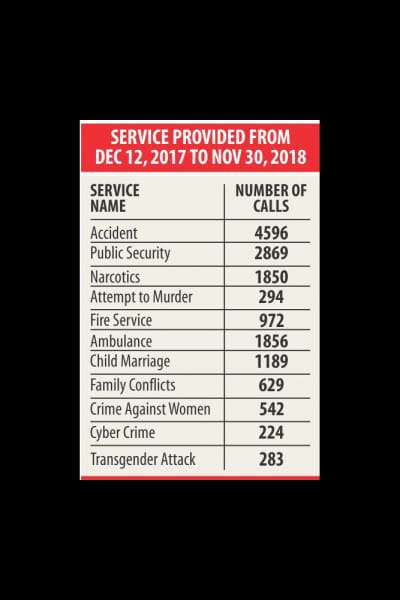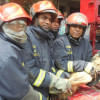999 proving handy

It was 6:00pm on November 13 when a young man was spotted shouting while vandalising a residence at Kaptan Bazar area in Cumilla.
Alone in the house, a young girl screamed for help from the neighbours. As they went forward to catch the culprit, one of them -- Abu Jafar -- made a quick call to the national emergency helpline – 999.
The dispatcher immediately informed Kotwali Police Station in the district and sub-inspector Kazi Hasan rushed to the spot to bring the situation under control.
SI Hasan said the man -- Md Mesbah, 22 -- was a drug addict and was vandalising the residence to get money for drugs.
This swift and prompt response was just one example of the 999 national emergency services. Since the service was inaugurated on December 12 last year, it has responded to 12.86 lakh calls till November 30.
Of the calls, 75 percent were for police service, 20 percent for fire service and 5 percent for ambulance service, according to the national help desk database.
On August 7, the 999 emergency service helped save 300 lives at one go when a ferry heading towards Kathalbari from Mawa started to fill up with water around 10:00am after an accident. As panic gripped the passengers, one of them -- Shohag -- called 999.
The dispatcher informed the coastguard, river police and fire service without delay, after which all of the passengers were successfully rescued.
INTRODUCTION OF MULTIPLE CHANNELS
In the primary stage of the helpline, the only way to call the toll free 999 number was from T&T and cell phones. But on December 1, the desk introduced multiple channels.
“Citizens can now avail the helpline service from Facebook messenger and by downloading the app -- BD police helpline,” Tabarak Ullah, superintendent of police of the emergency helpline, told The Daily Star.
The service would soon be available in Twitter and WhatsApp messaging as well, he said.
THE 'DISPERSE SYSTEM'
In the second phase of work that began on July 1, the authorities began setting up “disperse systems” in 321 police stations of eight metropolitan and eight range police units, according to officials.
Regarding the system, SP Tabarak said 999 dispatchers contact local duty officers in police stations after receiving a complaint. In some cases, the dispatcher finds the duty officer's number busy due to which the service may get delayed, he said.
To combat this issue, the “disperse system” had been introduced. “We have already set up separate 999 telephone sets in 200 police stations so that helpline officials are able to connect with the local police stations without any delay. The setting up of 121 more 999 sets will be completed shortly,” he said.
Once the police stations under eight metropolitan and range police units come under coverage, they would set up similar sets in 309 other police stations across the country, he added.
Besides, the service provider also started installing “mobile data terminal (MDT)” sets in all 1,300 police patrol cars to ensure quicker service, said Tabarak.
MDT sets were already installed in 92 patrol cars, he said, adding that the disperse system and MDT would also be installed in 350 fire stations and their vehicles in phases.
ENHANCING CAPACITY
With 463 employees, the national help desk was now capable to respond to 60 calls every minute, according to officials.
The construction of a 30 storey building for the help line's central command centre is under progress in the capital's Demra.
10-storeys of it is expected to be constructed by 2021 and the service provider would be able to respond to 500 calls at a time, said SP Tabarak, adding that steps were also being taken to build a secondary emergency service of 999 in Jashore so that the service was not interrupted in case the main command centre faces a natural disaster.
“Moreover, we have plans to provide one patrol car and two motorbikes for each of the police stations in the third phase of our plan,” he added.

 For all latest news, follow The Daily Star's Google News channel.
For all latest news, follow The Daily Star's Google News channel. 







Comments